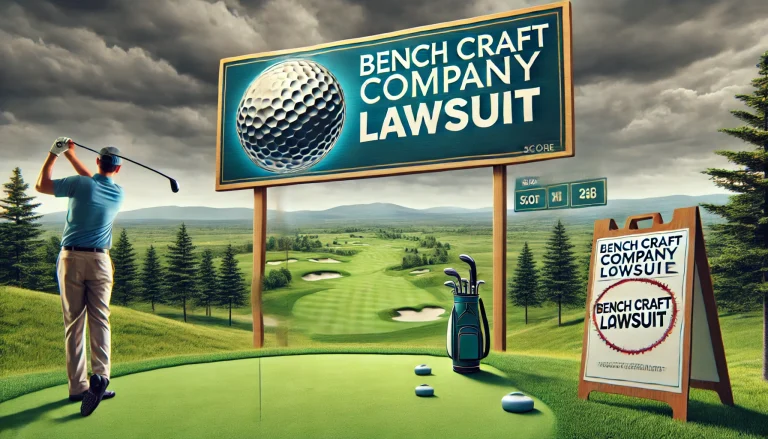Bench Craft Company (BCC) is a marketing firm that has long been recognized for its niche approach to advertising, focusing on golf course materials like scorecards and signage. While the company positioned itself as a leader in this field, allegations of deceptive practices led to the widely discussed Bench Craft Company lawsuit. This article explores the details of the lawsuit, including the claims, the legal proceedings, and the lessons learned for businesses and service providers alike.
About Bench Craft Company
Bench Craft Company specializes in providing advertising opportunities for businesses by incorporating their messages into golf course materials such as:
- Custom scorecards
- Tee box signage
- Course guides and yardage books
The company markets its services as a way for businesses to reach a highly targeted audience of golfers. For small and medium-sized businesses, this seemed like a great way to gain visibility. However, concerns soon emerged about the effectiveness and delivery of these services.
Bench Craft Company Lawsuit: What Happened and Why It Matters
The Bench Craft Company lawsuit brought attention to the challenges businesses face when advertising agreements go awry. Filed in 2018, the case centered on allegations that Bench Craft Company, a marketing firm specializing in golf course advertising, misrepresented the reach and effectiveness of their services. Small and medium-sized businesses that invested in advertising on scorecards, tee boxes, and course materials claimed they did not receive the promised return on investment (ROI).
Additionally, the lawsuit highlighted unfair contract terms, which made it difficult for businesses to dispute charges or exit agreements. This created significant financial and operational strain on clients, many of whom were small businesses relying on limited budgets.
In 2023, the lawsuit was resolved through an out-of-court settlement. While Bench Craft Company did not admit wrongdoing, the case emphasized the importance of transparency and ethical practices in marketing. It serves as a cautionary tale for both service providers and clients to prioritize fairness, accountability, and clear communication in business dealings.
What Triggered the Lawsuit?
The class-action lawsuit against Bench Craft Company, filed in 2018, stemmed from a range of allegations by disgruntled clients. Below are the key issues that led to legal action:
Misrepresentation of Advertising Reach
- Clients alleged that Bench Craft exaggerated the potential audience for their advertising placements.
- Promises of exposure to thousands of potential customers were reportedly overstated, leaving businesses disappointed.
Failure to Deliver Results
- Many clients claimed that their advertisements were either not displayed as agreed or failed to generate the promised return on investment (ROI).
- Businesses noted that the materials often did not reach the audience they were promised.
Unfair and Onerous Contract Terms
- The contracts offered by Bench Craft were heavily skewed in favor of the company.
- Businesses reported difficulty in disputing charges, ending agreements, or receiving refunds for unfulfilled commitments.
These issues combined to paint a picture of a company that some felt prioritized profits over delivering value to its clients.
The Legal Journey
The lawsuit unfolded over several years, from the initial complaints to the eventual resolution:
Early Complaints
- The first red flags appeared when clients began reporting discrepancies between the services they were promised and what they received.
Class-Action Filing (2018)
- A group of businesses joined forces to file a class-action lawsuit against Bench Craft Company. The suit accused the company of engaging in deceptive business practices and violating contract terms.
Court Proceedings
- Over the years, both sides presented their cases. Bench Craft maintained that they had delivered their services as agreed and denied any intentional wrongdoing.
Settlement (2023)
- After lengthy negotiations, the lawsuit was settled out of court in 2023. Although Bench Craft did not admit guilt, they agreed to compensate the plaintiffs with an undisclosed financial settlement.
Bench Craft Company’s Response
Throughout the legal proceedings, Bench Craft Company defended itself by:
- Arguing that they fulfilled their contractual obligations.
- Attributing client dissatisfaction to external factors like market conditions or unrealistic expectations.
- Maintaining that their business model was legitimate and effective for the right audience.
While these arguments helped mitigate some of the backlash, the lawsuit still caused significant damage to the company’s reputation.
Impacts of the Lawsuit
The effects of the lawsuit were felt not only by the involved parties but also by the broader advertising industry:
Impact on Small Businesses
- Many of the plaintiffs were small and medium-sized enterprises (SMEs) that suffered financial losses.
- The case highlighted the importance of carefully evaluating advertising agreements.
Reputation Damage for Bench Craft
- The lawsuit raised questions about Bench Craft’s practices, prompting scrutiny from potential clients.
- The company had to work to rebuild trust and improve its transparency.
Broader Lessons for the Industry
- The case underscored the need for ethical practices in advertising.
- Transparency and accountability became focal points for similar businesses.
Lessons Learned
The Bench Craft Company lawsuit offers valuable lessons for both businesses and service providers:
Transparency is Essential
- Companies must ensure their claims about services are truthful and backed by data.
Fair Contracts Build Trust
- Agreements should be clear, and balanced, and allow for fair dispute resolution.
Client Vigilance is Crucial
- Businesses must conduct due diligence before signing contracts or committing to advertising deals.
Conclusion
The Bench Craft Company lawsuit serves as a powerful reminder of the importance of ethical business practices and the consequences of failing to meet client expectations. For Bench Craft, it was a wake-up call to reevaluate their approach to customer relations and service delivery. For businesses, it highlighted the importance of vigilance and understanding when entering into advertising agreements.
This case is not just about a single company; it’s a lesson for the entire marketing industry. Transparency, fairness, and accountability are not just good practices—they are essential for long-term success.
FAQs
What was the main issue in the Bench Craft Company lawsuit?
The lawsuit centered on allegations of deceptive advertising practices, unmet client expectations, and unfair contract terms.
When was the lawsuit against Bench Craft Company filed?
The class-action lawsuit was filed in 2018 by a group of dissatisfied business clients.
How was the Bench Craft Company lawsuit resolved?
In 2023, the case was settled out of court with an undisclosed financial agreement, though BCC did not admit wrongdoing.
What industries were most affected by the lawsuit?
Small and medium-sized businesses across various industries that invested in golf course advertising were primarily impacted.
What lessons can businesses learn from this case?
Businesses should prioritize contract transparency, ethical practices, and clear communication to avoid similar legal disputes.
Article Recommendations
Third Culture Bakery Lawsuit: How Public Opinion Influences Intellectual Property Decisions
Abilene Asbestos Legal Question: How to Identify, Handle, and Seek Justice for Asbestos Exposure
Vermont Mesothelioma Legal Question: How Vermont’s Statute of Limitations Impacts Your Case




